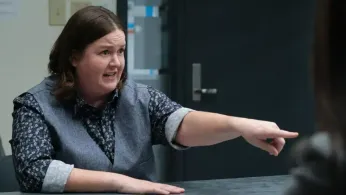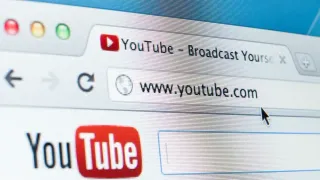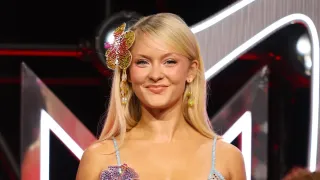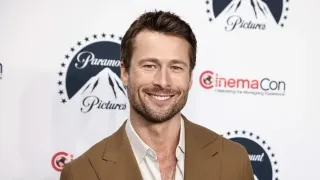
2 hours ago
CBS’s “DMV” Shifts Into Gear: Nonbinary Star Molly Kearney Leads Inclusive Workplace Comedy
READ TIME: 4 MIN.
CBS is set to make television history this fall with the premiere of “DMV,” a fresh workplace comedy starring nonbinary actor Molly Kearney in a leading role. The series, debuting October 13, 2025, represents a significant step forward in LGBTQ+ representation on network television, both behind and in front of the camera .
Set in a fictional East Hollywood Department of Motor Vehicles office, “DMV” explores the daily lives of a rag-tag team of employees as they navigate a minefield of bureaucracy, irate customers, and the existential dread that comes with public service. The show balances biting humor with moments of genuine empathy, reflecting the diversity—and resilience—of its characters .
Molly Kearney, known for their standout performances on “Saturday Night Live,” steps into the role of Barbara, the DMV’s newly promoted manager whose good intentions are often undermined by poor execution. Kearney’s casting marks the first time a nonbinary actor has headlined a primetime comedy series on CBS, signaling the network’s commitment to authentic storytelling and inclusive casting practices .
Kearney has been vocal about the importance of visibility for nonbinary and gender-diverse people in media. In a recent interview, they shared: “It means a lot to me to play a character who isn’t defined by their gender, but by their quirks, flaws, and relationships. That’s real life for so many of us, and it’s time our stories were told on screen” .
The ensemble cast includes Tim Meadows as Gregg, a misanthropic former English teacher; Harriet Dyer as Colette, a driving examiner with a penchant for existential crises; Alex Tarrant as Noa, the new employee; Tony Cavalero as Vic, a bouncer-turned-DMV clerk; and Gigi Zumbado as Ceci, a sharp-tongued photographer .
“DMV” draws on the real-life experiences of marginalized workers, particularly those who identify as LGBTQ+. The writing team, led by Dana Klein, has made deliberate choices to ensure that diverse identities are reflected both in the script and the cast. The show’s setting—a government office where differences are often overlooked or misunderstood—serves as a microcosm for broader social dynamics, highlighting the importance of solidarity and mutual support among employees .
While workplace comedies have long relied on archetypes and stereotypes, “DMV” challenges these conventions by foregrounding characters whose gender, sexuality, and backgrounds are treated with nuance and respect. Kearney’s Barbara is not defined by their nonbinary identity, but by their compassion, ambition, and vulnerability—traits that resonate with viewers of all backgrounds.
CBS has worked closely with LGBTQ+ organizations, including GLAAD, to ensure that the series avoids harmful tropes and provides meaningful visibility for nonbinary and transgender people. Early feedback from advocacy groups has been positive, with praise for the show’s commitment to authenticity and intersectionality .
Developed by Dana Klein and directed by Trent O’Donnell (“Ghosts”), “DMV” was filmed on location in Montreal, Canada in late 2024, with production ramping up over the summer of 2025 . Anonymous Content, Kapital Entertainment, and CBS Studios have backed the project, which received a full season order of 20 episodes—an increasingly rare vote of confidence in a new network comedy .
The series will air Mondays at 8:30 p.m. PT and will be available for streaming on Paramount+, extending its reach to a digital audience that has long demanded more diverse and inclusive programming .
The premiere of “DMV” arrives at a time when representation of LGBTQ+ identities in mainstream media remains a critical issue. According to the most recent GLAAD “Where We Are on TV” report, nonbinary characters are still significantly underrepresented, especially in leading roles on broadcast television .
For queer audiences, the show’s visibility has the potential to foster greater understanding and acceptance, both among viewers and within the industry itself. By centering a nonbinary character in a position of authority—albeit one fraught with comedic missteps—“DMV” offers a refreshing alternative to the usual narratives of marginalization. The show’s humor is grounded in empathy, never at the expense of its characters’ dignity or identity.
Community leaders and advocates have voiced cautious optimism about the series. “We’re excited to see a network like CBS take steps toward more robust LGBTQ+ inclusion,” said a spokesperson for the Human Rights Campaign. “It’s critical that nonbinary people are portrayed as multidimensional and relatable, not just as sidekicks or background characters” .
As “DMV” prepares to hit the airwaves, its creators hope to spark conversations about work, identity, and belonging. The series invites viewers to reconsider their assumptions—not only about the DMV, but about the people who keep society running behind the scenes. Early trailers promise a blend of workplace absurdity and heartfelt moments, from tense driving tests to the quiet acts of solidarity that define the best workplace comedies .
For LGBTQ+ viewers and allies, “DMV” represents more than just a new series—it’s a milestone in the ongoing journey toward media representation that is truly reflective of our communities. With Molly Kearney at the helm, the show stands as both a celebration of queer talent and a call to action for greater inclusivity across the entertainment landscape.






